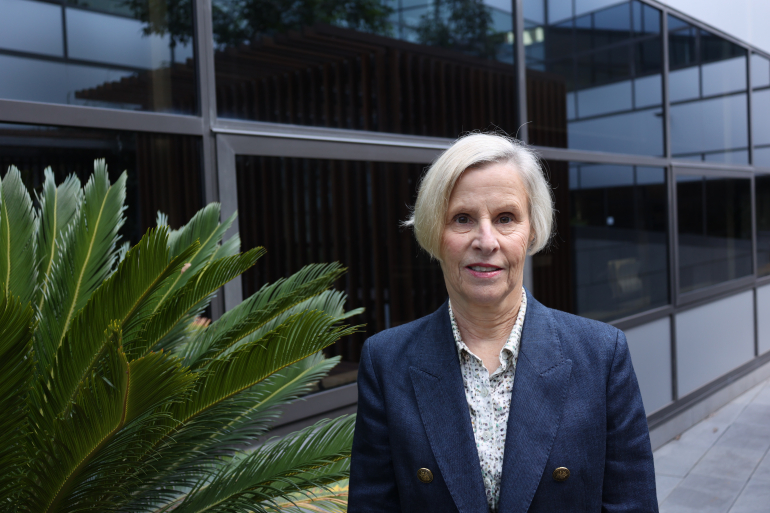Professor Deborah Healey currently teaches at UNSW Law and serves as the Co-Director of the China International Business and Economic Law (CIBEL) Centre. We asked Deborah about her research and achievements throughout her time with us.
Can you give us a quick overview of your research?
I research and write mainly in the areas of competition law and policy in Australia, China, Hong Kong and the ASEAN jurisdictions. I am most interested in the impact of government in markets, mergers, implications of the digital economy and banking and finance. I have also researched and written over a long period of time in consumer law and sports law.
What or who sparked your interest in pursuing this field of research?
My interest in competition law in Australia is very longstanding but was originally quite by chance. I have always been interested in the role of government in the market, having seen its impact when I was working as a solicitor in large firms. My interest in competition law in China was sparked by the questions of my international students at around the time China was considering adopting its Antimonopoly Law in the early 2000s. My interest in ASEAN jurisdictions grew from my longstanding travel to the region and the more recent adoption of disparate competition laws by ASEAN members. Sport has always been an abiding interest of mine, both as a competitor and as a spectator.
How would you explain and introduce your research to someone with no legal background in the area (say, at a social event)?
Competition law is all about effective markets. When there is effective competition in markets, they deliver efficiency benefits to the economy and to consumers. Competition law and policy create a level playing field where the most efficient competitors deliver goods and services which purchasers want at the best prices and innovate to win market share. So, competition law attacks those who engage in identified types of anti-competitive conduct, like cartels, anticompetitive mergers and abuse of market power. Competition policies are additional policies which support a competitive environment. In particular, governments, their commercial enterprises, and their laws and policies can also significantly impede competition in markets, both by design and inadvertently.
What project are you working on that excites you?
CIBEL just been awarded a $130,000 research grant under the Australian Government’s National Foundation for Australia-China Relations (NFACR) scheme for the project titled ‘Competition Law in the Digital Age: Enhancing Australian and Chinese Business Understanding.’ With my CIBEL co-Director Associate Professor Weihuan Zhou and postdoctoral researcher Dr Xue (Sophia) Bai, I will be researching supply chain resilience and sustainability with a focus on Competition Law in the Digital Environment. This project aims to enhance the capacity of Australian businesses to engage confidently with their counterparts in China to tackle shared challenges posed by ongoing and potential supply chain disruptions in a sustainable way. We will be researching, and engaging with policy makers, regulators, academics and businesses in both countries over the next 18 months. We will also be conducting two significant forums in Sydney. As to Australian competition law, I am advocating for reform of Australia’s merger laws and looking at ways of dealing with market power in the digital space. These issues are very important to Australia as a jurisdiction.
What do you hope to achieve with your research/impact & engagement in the next few years?
I hope to provide thoughtful analysis of cutting-edge competition law issues in Australia and internationally to improve regulation and to assist business to better compete in markets both at national and international levels.
What research/impact & engagement achievement are you most proud of and why?
My long-standing commitment to addressing the impact of government in markets has led to work at national and international level to assist jurisdictions with improvements in policies such as competitive neutrality and regulatory review. My writings on sports law are oft cited over many years and have assisted those in sport to better understand their legal obligations at high level and at grass roots level.
What is an exciting and unexpected thing you have learnt while doing research which you think everyone should know more about?
There is always something which will illuminate your thinking if only you can find it- often it is quite by accident.
Is there a particular topic you would like to connect with other scholars and industry partners on?
I am interested in collaborating on the practical digital issues affecting trade with China.
What (specific) change do you hope your research will bring within your area of law and how do you anticipate it will influence and affect the relevant aspects (or the broader community)?
I trust that I can help people in business and the community to understand the importance of competition to our prosperity and way of life. In my sport law research, I hope I enable people to have a better understanding of their rights and responsibilities.
You can connect with Professor Deborah Healey and her work via Linkedin and email (d.healey@unsw.edu.au).
